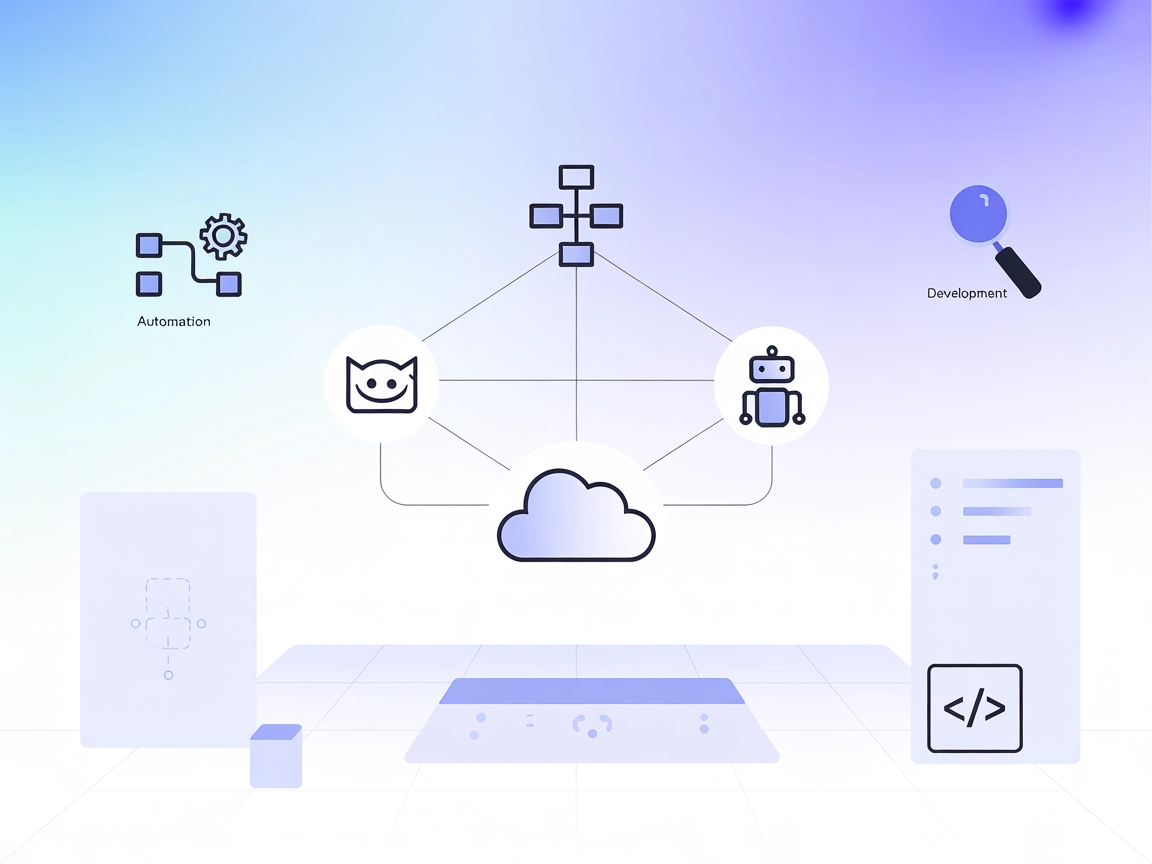
GitHub MCP Server Integration
The GitHub MCP Server enables seamless AI-powered automation and data extraction from the GitHub ecosystem by bridging AI agents and GitHub APIs. Enhance your d...

FlowHunt’s GitHub Enterprise MCP Server bridges your AI assistants and GitHub Enterprise, unlocking automation and actionable insights for secure enterprise codebases.
FlowHunt provides an additional security layer between your internal systems and AI tools, giving you granular control over which tools are accessible from your MCP servers. MCP servers hosted in our infrastructure can be seamlessly integrated with FlowHunt's chatbot as well as popular AI platforms like ChatGPT, Claude, and various AI editors.
The GitHub Enterprise MCP Server acts as an integration layer between AI assistants and GitHub Enterprise repositories. It enables seamless connectivity for AI tools to interact with GitHub Enterprise data, allowing developers to enhance their workflows by automating tasks such as repository management, issue tracking, and pull request operations. By serving as a bridge between AI clients and GitHub Enterprise, this MCP server empowers assistants to query repositories, manage files, and interact with organizational data more effectively. This connectivity is particularly valuable for enterprises seeking to streamline development, improve codebase insights, and automate repetitive tasks through AI-driven interactions with their private GitHub infrastructure.
The repository does not explicitly list any prompt templates. No information available.
The repository does not explicitly document core MCP resources. No information available.
The repository does not provide a direct list of tools in server.py. No information available.
Repository Automation
Enable AI assistants to automate repository management tasks, such as creating, updating, and deleting repositories within GitHub Enterprise.
Issue Tracking
Allow developers to interact with issues, including creating, closing, and commenting on issues, directly through AI-powered workflows.
Pull Request Operations
Streamline code review processes by automating pull request creation, merging, and review notifications within enterprise environments.
Enterprise Data Insights
Facilitate the extraction and summarization of organizational codebase statistics and activity for project managers and leads.
{
"mcpServers": {
"github-enterprise-mcp": {
"command": "npx",
"args": ["@containerelic/github-enterprise-mcp@latest"]
}
}
}
Securing API Keys:
{
"mcpServers": {
"github-enterprise-mcp": {
"command": "npx",
"args": ["@containerelic/github-enterprise-mcp@latest"],
"env": {
"GITHUB_TOKEN": "${GITHUB_TOKEN}"
},
"inputs": {
"org": "your-org"
}
}
}
}
{
"mcpServers": {
"github-enterprise-mcp": {
"command": "npx",
"args": ["@containerelic/github-enterprise-mcp@latest"]
}
}
}
cursor_mcp.json or create one if it doesn’t exist.{
"mcpServers": {
"github-enterprise-mcp": {
"command": "npx",
"args": ["@containerelic/github-enterprise-mcp@latest"]
}
}
}
{
"mcpServers": {
"github-enterprise-mcp": {
"command": "npx",
"args": ["@containerelic/github-enterprise-mcp@latest"]
}
}
}
Note:
Always secure API tokens using environment variables. Example:
{
"mcpServers": {
"github-enterprise-mcp": {
"command": "npx",
"args": ["@containerelic/github-enterprise-mcp@latest"],
"env": {
"GITHUB_TOKEN": "${GITHUB_TOKEN}"
},
"inputs": {
"org": "your-org"
}
}
}
}
Using MCP in FlowHunt
To integrate MCP servers into your FlowHunt workflow, start by adding the MCP component to your flow and connecting it to your AI agent:

Click on the MCP component to open the configuration panel. In the system MCP configuration section, insert your MCP server details using this JSON format:
{
"github-enterprise-mcp": {
"transport": "streamable_http",
"url": "https://yourmcpserver.example/pathtothemcp/url"
}
}
Once configured, the AI agent is now able to use this MCP as a tool with access to all its functions and capabilities. Remember to change “github-enterprise-mcp” to whatever the actual name of your MCP server is and replace the URL with your own MCP server URL.
| Section | Availability | Details/Notes |
|---|---|---|
| Overview | ✅ | |
| List of Prompts | ⛔ | No prompts found |
| List of Resources | ⛔ | Not explicitly documented |
| List of Tools | ⛔ | Not found in server code |
| Securing API Keys | ✅ | Example provided |
| Sampling Support (less important in evaluation) | ⛔ | Not mentioned |
Roots support: ⛔ Not documented
Sampling support: ⛔ Not documented
Based on the available documentation, the GitHub Enterprise MCP Server provides basic integration information and setup instructions, but lacks explicit documentation for prompts, resources, and tools. Therefore, its score is moderate for enterprise use but limited by missing technical detail.
| Has a LICENSE | ⛔ |
|---|---|
| Has at least one tool | ⛔ |
| Number of Forks | 3 |
| Number of Stars | 21 |
It is an integration layer connecting AI assistants to GitHub Enterprise repositories, enabling automated repository management, issue tracking, pull request operations, and organizational data analysis within secure enterprise environments.
AI assistants can automate repository creation, updating, deletion, issue management, pull request operations, and codebase insights—streamlining repetitive development tasks.
Always use environment variables to store sensitive information like API tokens. The configuration examples show how to use `${GITHUB_TOKEN}` for secure setup.
No. The repository does not explicitly provide prompt templates, listed resources, or documented tools. The focus is on the integration layer and automation capabilities.
Yes, it is designed to connect with private GitHub Enterprise instances. However, technical documentation for advanced use cases is limited.
Integrate FlowHunt’s GitHub Enterprise MCP Server for automated repository management, smart issue tracking, and seamless AI-powered development operations.

The GitHub MCP Server enables seamless AI-powered automation and data extraction from the GitHub ecosystem by bridging AI agents and GitHub APIs. Enhance your d...

The GitHub Actions MCP Server empowers AI assistants to manage GitHub Actions workflows, automate CI/CD tasks, analyze workflow runs, and enhance security in so...

GitMCP is a free, open-source Model Context Protocol (MCP) server that connects AI assistants with any GitHub repository for code-aware completions, exploration...
Cookie Consent
We use cookies to enhance your browsing experience and analyze our traffic. See our privacy policy.